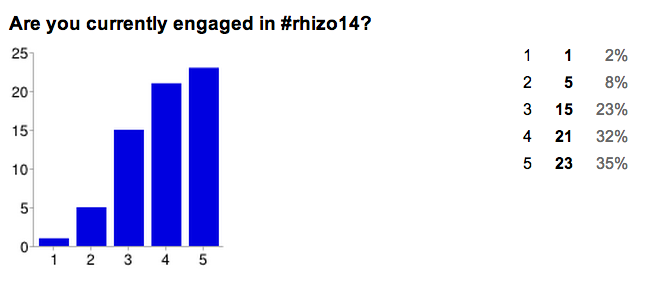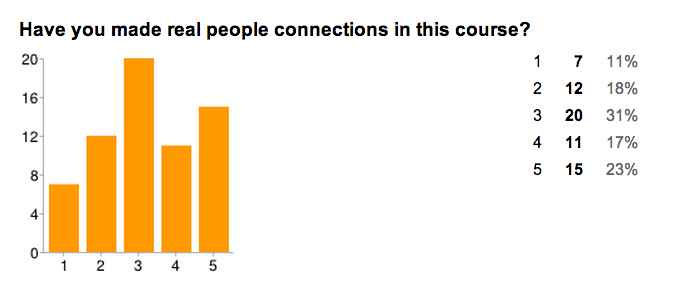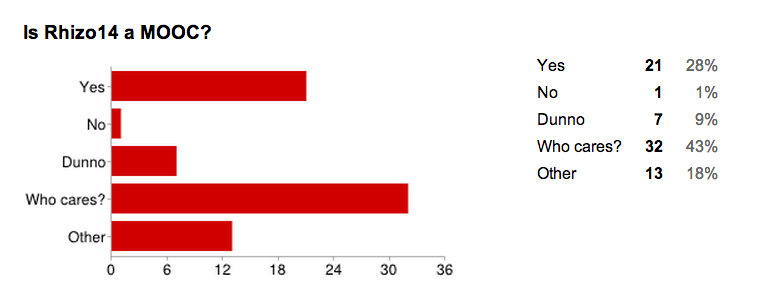Well… we got 65 responses to the week 2 feedback form. How representative is that? We have about 400 folks registered on the P2PU course page, 177 members of the facebook page, 150 members of the google + page over 3000 tweets of the #rhizo14 hashtag. Your guess is as good as mine in terms of how many people that is. I would say that 65 represents a reasonable enough percentage that we can talk a little bit about what people had to say an draw some vaguely warranted stories about what that might mean.
This is real teacher geek stuff… I can’t imagine who’s going to read this blog post… but i love talking about it!
Full answers available here. If you want the spreadsheet send me an email.
Question 1
Are you currently engaged in #rhizo14?
This is a context piece really. Naturally you’d expect the people who respond to the survey for an open course to generally be the people who are engaged. What I was hoping to get a sense of was what number of people who cared to respond felt like they weren’t ‘fully engaged’. I feel pretty good about this result. Even if those 59 people are the only people fairly engaged in the open course that’s pretty solid. I suspect that there are a few engagees who might not have gotten round to filling out the form. So, from what i can tell, Win!

Question 2
Have you made real people connections in this course?
Not a great question in retrospect. I was looking for the sense people had of the value of the connections they had made. I thought it might be interesting to ask the same questions at the end of the course. This one skews slightly towards more real connections, but is probably representative of the inclusion challenges of this decentralized a course. We’ll call this one a draw.

Question 3
Dave is considering shortening the formal part of this course to 4 weeks. How would you feel about that?
Took some grief for this question. Some people thought I was quitting. 🙂 I was trying to understand how much people were attached to the framework of the course itself. If you wander through the answers, you’ll see that that questions were all over the place. It gave me the answer I was expecting – inconclusive. I was encouraged to see a number of different perspectives. I particularly like the ‘That’s help your completion rates’. I think it could have been better asked, but still, I like this one.
Question 4
Is Rhizo14 a MOOC?
I couldn’t help myself. The majority seem to both understand the question and be beyond it. I still feel sad about the word MOOC losing it’s collaborative edge. Maybe it’ll come back 🙂

Question 5
How would you describe your role vs. Dave’s role in #rhizo14
This elicited all kinds of answers. Among many gems i have to point to one in particular
Somehow Dave got into the room without anyone checking his pockets and there are now frogs jumping around on the linoleum and swimming in the punch bowl. I pick another frog and we hop around for a bit. Seriously, Dave seems ethereal and backgroundy but also attentive like a good tour guide.
how awesome is that? I think if you take the time to look through the question, it provided many with an opportunity to not only reflect on the course, but on the topic of the course as well. There certainly still is a power division there between the roles, but the irreverence must speak to some deconstruction of it 🙂
Question 6
What would make the rest of this course better?
Never hurts to give people a chance to reflect on improving the format. A fair number of people suggesting that they are having some technical challenges. Some excellent advice about people being explicit about their own learning context rather than talking about ‘learning generally’. Some people not liking the timing of the live event (I hear you, we’ve changed it). Someone suggested an IRC channel.
I think, in many cases, people would like the social contract re-explained. They think that people aren’t accustomed to sharing in mixed environments and don’t necessarily know how to play as well with others as they could. This question of the social contract between participants is extremely important and bears further thought. We have people from MANY different cultures, from all over really. How do we find a common ground in which we can exchange our thoughts freely. It’s a good question.
Question 7
Finally… tell me what you like about this course.
Some folks said some nice things about me… and I thank you. More often, however, people are happy to have met people that help them think differently. Hell. What else could you want from a course.
Thanks for real teacher geek stuff. Great classroom reading while waiting for stuff to happen. God I love downtime.
It’s all g(r)eek to me.
Somehow I missed the call to respond to the survey. Filled it in belatedly after reading your ruminations about the 65 who made a more timely response. Hey, that could be called cheating as learning – I learned that it was worth my while to take time to respond reflectively.
I somehow just came across this today (i cannot imagine why i never saw it before!) but i loved reading it. In my everyday work we help faculty do surveys to get feedback on students. I now think theymight benefit from writing something like u have done to reflect on it.
Meanwhile, i thought it was a bit funny that the whole course you are open to how participants want to take things, and in the survey, you’re looking for particular answers! I am talking question 4 and remembering when u first told me about rhizo14 not necessarily reaching “MOOC status” which i thought referred to the numbers… How funny is it that the person who made up the term MOOC teaches sthg open and free online for the first time alone, right? But does not want to call it a MOOC. But you know i like to call it that because it brings back that connection into MOOCs again and it should be there. But am pretty sure rhizo14 was more than a cMOOC, too!!